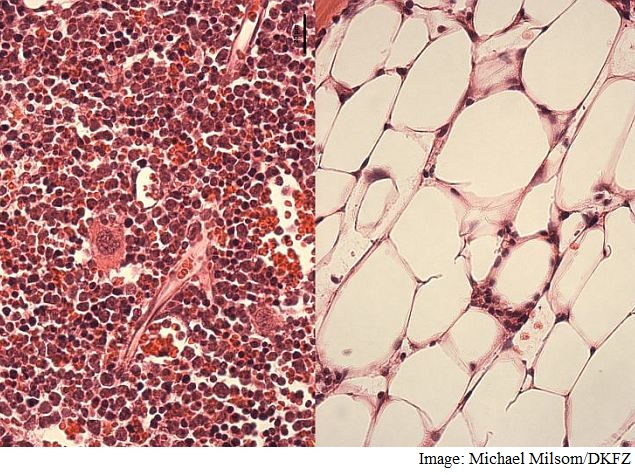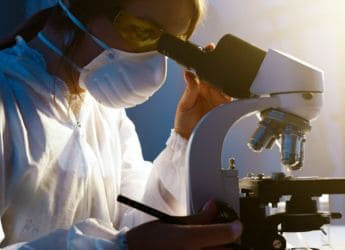- Home
- Science
- Science News
- Damaged Stem Cells Linked With Ageing and Cancer: Study
Damaged Stem Cells Linked With Ageing and Cancer: Study

Under conditions of stress, haematopoietic stem cells are driven into a state of rapid cell division and this can directly damage the DNA, reveals new research.
Under normal conditions, several different types of tissue-specific adult stem cells including haematopoietic stem cells, exist in dormancy where they rarely divide and have very low energy demands.
However, under conditions of stress, such as during chronic blood loss or infection, haematopoietic stem cells are driven into a state of rapid cell division in order to produce new blood cells and repair the damaged tissue.
"It's like forcing yourself out of the bed at midnight, getting into a sports car and being asked to drive as fast as possible around a race circuit while you are still half asleep," said study leader Michael Milsom of German Cancer Research Centre (DKFZ), Heidelberg. "The stem cells go from the state of rest to very high activity within a short space of time, requiring them to rapidly increase their metabolic rate, synthesise new DNA and coordinate cell division."
Experiments described in the study show that the increased energy demands of the stem cells during stress result in elevated production of reactive metabolites that can directly damage DNA.
If this happens at the same time when the cell is trying to replicate its DNA, then this can either cause the death of stem cells, or potentially lead to acquisition of mutations that may cause cancer, warn researchers.
Normal stem cells can repair the majority of this stress-induced DNA damage, but most times you are exposed to stress, it is quite possible that a given stem cell will inefficiently repair the damage, become mutated and act as a seed in the development of leukaemia.
"We believe that this model perfectly explains the gradual accumulation of DNA damage in stem cells with age and the associated reduction in the ability of a tissue to maintain and repair itself as you get older," Milsom said.
"This work is a big step towards understanding a range of age-related diseases," said study co-author prof Andreas Trumpp, director of HI-STEM and head of the Division of Stem Cells and Cancer at the DKFZ.
"By understanding the mechanism through which stem cells age, we can start thinking about strategies to prevent or at least reduce the risk of damaged stem cells which causes ageing and plants the seed of cancer," said Trumpp.
Catch the latest from the Consumer Electronics Show on Gadgets 360, at our CES 2026 hub.
Related Stories
- Samsung Galaxy Unpacked 2025
- ChatGPT
- Redmi Note 14 Pro+
- iPhone 16
- Apple Vision Pro
- Oneplus 12
- OnePlus Nord CE 3 Lite 5G
- iPhone 13
- Xiaomi 14 Pro
- Oppo Find N3
- Tecno Spark Go (2023)
- Realme V30
- Best Phones Under 25000
- Samsung Galaxy S24 Series
- Cryptocurrency
- iQoo 12
- Samsung Galaxy S24 Ultra
- Giottus
- Samsung Galaxy Z Flip 5
- Apple 'Scary Fast'
- Housefull 5
- GoPro Hero 12 Black Review
- Invincible Season 2
- JioGlass
- HD Ready TV
- Laptop Under 50000
- Smartwatch Under 10000
- Latest Mobile Phones
- Compare Phones
- Vivo Y500i
- OnePlus Turbo 6V
- OnePlus Turbo 6
- Itel Zeno 20 Max
- OPPO Reno 15 Pro Mini 5G
- Poco M8 Pro 5G
- Motorola Signature
- Vivo Y50e 5G
- Lenovo Yoga Slim 7x (2025)
- Lenovo Yoga Slim 7a
- Realme Pad 3
- OPPO Pad Air 5
- Xiaomi Watch 5
- Huawei Watch 10th Anniversary Edition
- Acerpure Nitro Z Series 100-inch QLED TV
- Samsung 43 Inch LED Ultra HD (4K) Smart TV (UA43UE81AFULXL)
- Asus ROG Ally
- Nintendo Switch Lite
- Haier 1.6 Ton 5 Star Inverter Split AC (HSU19G-MZAID5BN-INV)
- Haier 1.6 Ton 5 Star Inverter Split AC (HSU19G-MZAIM5BN-INV)

















